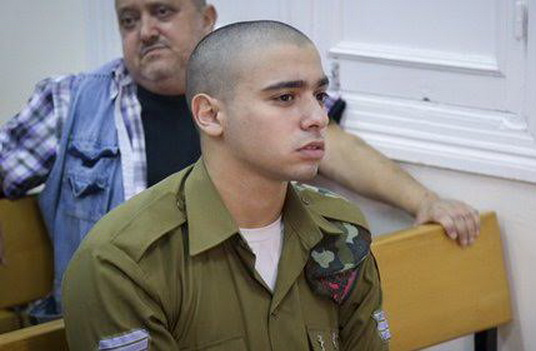Last March, army medic Elor Azaria was filmed firing a bullet into the head of Abed al-Fattah al-Sharif, a 21-year-old Palestinian, as he lay wounded on the ground in the city of Hebron. On Wednesday, Azaria was found guilty of the reduced charge of manslaughter by a military tribunal. The three military judges ruled: “He opened fire in violation of orders. The terrorist [Sharif] did not pose any threat.” MK Aida Touma-Suleiman (Hadash – Joint List), a communist member of the Israeli parliament, told Al Jazeera that the context for the trial was the growing fear in Israel that its soldiers would, one day, face scrutiny from bodies like the International Criminal Court (ICC) in the Hague.
“In a clear-cut case like this, it is important for Israel to look as though it is taking war crimes seriously, otherwise the ICC might itself decide to investigate,” she said. “But the case has caused problems because it has upset right-wing politicians and much of the Israeli public, who expect absolute impunity for soldiers.” Given that mood, the army quickly dropped an initial charge of murder against Azaria. Instead, prosecutors settled for a manslaughter indictment, a decision Sharif’s family denounced this week as a “perversion of justice”.
Even before the sentencing, politicians, including Netanyahu, launched a campaign to pressure President Reuven Rivlin to pardon the soldier. Touma-Suleiman said that historical precedents, such as the amnesties given to security officials involved in the Kfar Qassem massacre and the Bus 300 affair, suggested that the campaign stood a good chance of success. “There has been a reign of terror designed to silence anyone who has tried to stand up for human rights and the rule of law in this case,” she said.
Touma-Suleiman pointed to the stark contrast between Azaria‘s trial and that of Ahmed Manasra, a 13-year-old Palestinian who was jailed for 12 years in an adult prison in November. An Israeli military court found the child guilty of attempted murder, even though the judge accepted that Manasra had stabbed no one in an attack in Jerusalem in 2015. His older cousin, who was shot dead at the scene, had been responsible for stabbing two Israelis. “Manasra is a child, but the military court system dealt with him far more harshly than it has a soldier like Azaria,” she said. “When the occupier is judge and jury, there is no hope for equality before the law or of justice.”
Yesh Din, an Israeli human rights group, issued a report this week noting that no investigations were conducted into the killing by Israeli soldiers of 76 Palestinians in the occupied West Bank last year. The data, it said, showed an “inability and unwillingness” to address unlawful conduct by soldiers. According to Adalah, a legal centre for Israel’s Arab-Palestinian minority, noted that there had been “zero indictments” in a range of attacks it had identified by Israel that killed Palestinians during Israel’s 2014 assault on Gaza. Human Rights Watch has noted that, in the months before the Hebron shooting, senior government ministers and security officials had repeatedly called for a “shoot-to-kill” policy against Palestinian attackers, even when they posed no threat.
Related:
Israeli Soldier Found Guilty of Manslaughter for Hebron Shooting of Incapacitated Palestinian



